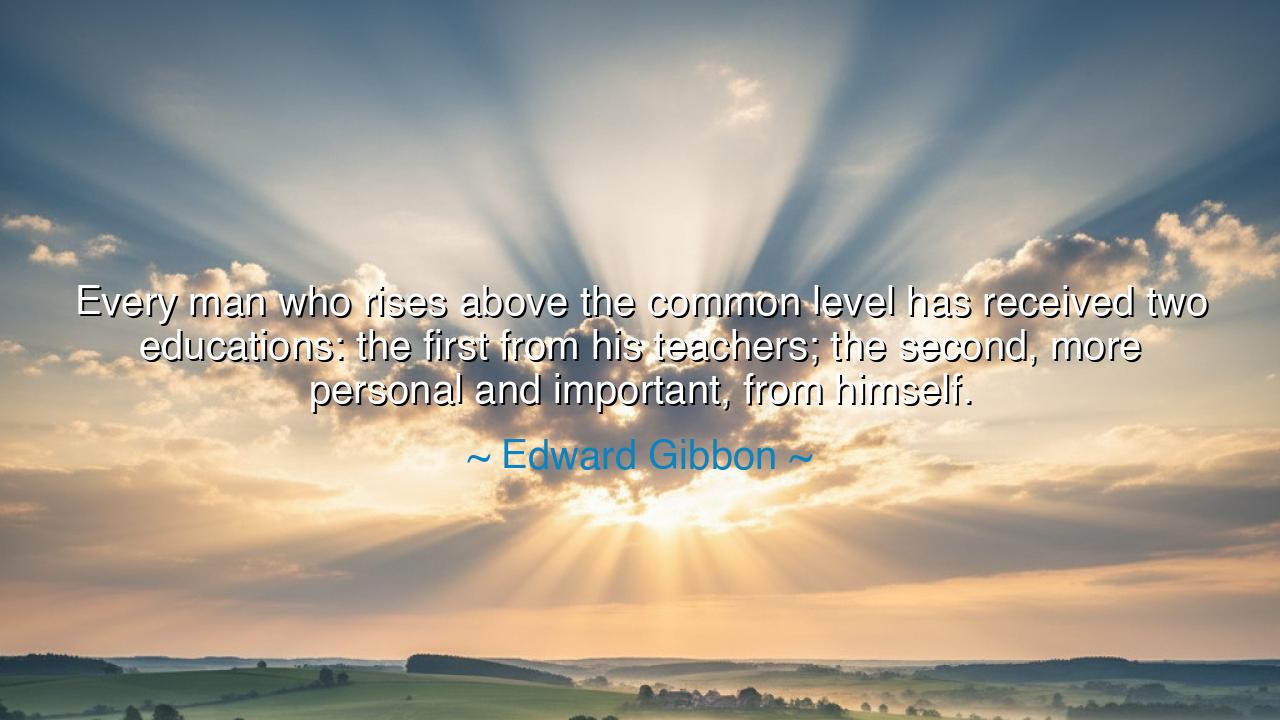
Every man who rises above the common level has received two
Every man who rises above the common level has received two educations: the first from his teachers; the second, more personal and important, from himself.






Hear, O seekers of greatness, the words of Edward Gibbon, the historian who chronicled the rise and fall of empires: “Every man who rises above the common level has received two educations: the first from his teachers; the second, more personal and important, from himself.” In this truth lies the key to advancement, the hidden fire by which an ordinary soul ascends to extraordinary heights. For instruction alone cannot crown a man with wisdom—he must also labor within his own mind, forging discipline, shaping character, and awakening understanding that no teacher can bestow.
The first education, as Gibbon tells us, comes from without. It is the knowledge handed down by parents, schools, and mentors—the letters learned, the facts remembered, the laws of thought impressed upon the young mind. This is the soil in which the seeds are planted. Without it, the child grows wild, lacking form and order. Yet Gibbon warns us that this is not enough. Many possess the first education, but remain stagnant. They carry the tools but never use them, having borrowed wisdom without ever making it their own.
The second education is the true fire. This is the education of the self, born of struggle, reflection, curiosity, and perseverance. It is when the student begins to question, to test, to seek beyond what has been given. It is when one reads not because a teacher commands it, but because the soul hungers for truth. It is when one fails, rises again, and learns from failure. This is the education that cannot be forced, for it springs from within; and it is this that separates the common from the great.
History bears witness. Consider Abraham Lincoln, who received but a handful of months in formal schooling. His first education was meager, yet his second was vast. By candlelight he taught himself law, devoured books, practiced speeches, and cultivated wisdom far beyond his circumstances. It was this inner schooling that made him not merely a politician, but a leader whose words still echo through the ages. Without his second education, his name would have remained unknown among the multitude.
Or look to Leonardo da Vinci, apprenticed to masters in Florence for his first education, but never content to stop there. He pursued his second with tireless hunger—dissecting corpses to study anatomy, sketching machines, observing nature, and filling thousands of pages with thoughts. His teachers gave him craft, but his self-education gave him genius. He rose above his age not by what was taught, but by what he taught himself.
Beware, then, those who rely only on the first path. They may achieve competence, but never greatness. They may repeat the knowledge of others, but never create their own. For the world is filled with those who have been schooled, yet few who have truly educated themselves. The one who rises above the common level is he who takes his learning into his own hands, who refuses to be a passive vessel, and who transforms received knowledge into personal wisdom.
Therefore, O children of tomorrow, take this charge: honor your teachers, but do not stop with them. Let their lessons be the foundation, not the ceiling. Seek your second education in solitude, in books, in labor, in reflection, in the fire of experience. Question, create, and push beyond the limits handed to you. For only then will you rise above the common level, and only then will your knowledge become truly your own.
The lesson is clear: greatness requires two educations, and the second is the more important. Learn what others can teach, but teach yourself what no one else can. In doing so, you will walk the path of Gibbon’s wisdom and join the company of those who did not stop at the common level but reached for the heights of destiny.






AAdministratorAdministrator
Welcome, honored guests. Please leave a comment, we will respond soon